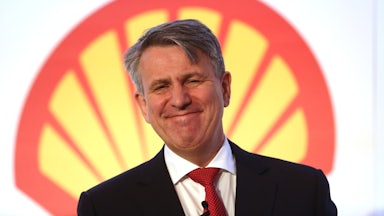Should scholars who research climate change be funded by the companies driving it? How someone answers that question depends on their thoughts on those firms’ role in the world and questions of scholarly ethics. Currently, though, these scholars are funded by the industry—heavily.
The most recent news on this front concerns Harvard Law School professor Jody Freeman, who founded the law school’s environmental and energy law program. Freeman—who previously served as an adviser in the Obama White House—also makes roughly $350,000 per year as a paid board member at ConocoPhillips, The Guardian recently reported. The controversy emerged after a research cluster led by Freeman was awarded funding through the University’s Salata Institute for Climate and Sustainability to look into corporate net-zero pledges. Subsequent reporting showed that Freeman had facilitated a meeting between ConocoPhillips and the Securities and Exchange Commission. The revelation has sparked outrage from students and faculty, who have called on Freeman to resign from ConocoPhillips’s board.
Freeman is hardly alone in having links to the fossil fuel industry, though. More direct oil and gas industry funding—particularly when it comes to energy- and environment-related research—is ubiquitous. A study by Fossil Free Research and Data for Progress found that just six fossil fuel companies gifted at least $700 million to U.S. universities between 2010 and 2020. Such ties can serve multiple purposes for companies: outsourcing what might have been robust internal research departments to universities eager for new donations; reaping the reputational benefits of a partnership with an Ivy League school; building a pipeline of young researchers with a reason to be grateful to them; and influencing the debate about what sorts of climate policy are considered reasonable.
Documents unearthed in 2022 by the then-Democrat-controlled House Oversight Committee, scrubbed from its website after Republicans took over, shed some light on how those relationships work. Emails show BP executives in 2016 praising the many upsides of their financial support for Princeton University’s Carbon Mitigation Initiative, or CMI; the company has given $26.4 million to Princeton over the last decade.
“BP supports CMI to help manage risks,” an internal brief from that year notes, elaborating that the company “benefits when CMI disseminates sound information that supports effective public policy discussions.” CMI made two recommendations on “the kinds of things oil and gas companies should be doing in the face of Climate Change concerns,” per emails: “Address your core activities” (e.g., reduce operational emissions, focusing on a coal-to-gas switch) and “Engage policymaking and understand technology implications proactively.” CMI advised the company to be “real and helpful about carbon pricing.” Carbon pricing has long been a favorite policy of BP and other major fossil fuel producers. As former ExxonMobil lobbyist Keith McCoy said on a recorded call, that’s in no small part because they don’t think a carbon-pricing scheme will pass.
Staff at Princeton, other documents collected by the House Oversight Committee show, helped prepare a “Face Book” for a 2016 campus visit from John Mingé, chairman and president of BP America, “for all of the people John will meet during the trip.” Mingé’s assistant said disseminating the CMI takeaways to more than one top executive at BP would help “assure consistency of messaging.”
Bob Stout, BP’s former vice president and head of regulatory policy and advocacy, wrote in 2019 that the company’s ties to top universities were “key parts of our long-term relationship building and outreach to policy makers and influencers in the US and globally.” He noted, as well, that such schools “give us valuable input on our strategies and messaging.”
Additional funding for CMI came from ExxonMobil, which gave Princeton $10.7 million in research funding over the last decade. That included a five-year “E-ffiliates” partnership with Princeton’s Andlinger Center for Energy and the Environment. The Guardian also found that ExxonMobil scientist Tim Barckholtz taught a class there on “negative emissions technologies,” reportedly criticizing Princeton’s decision to divest its endowment from fossil fuel companies to students. Princeton announced last fall, as well, that it would cut off its extensive research ties to the industry, following years of pressure on campus and the recommendations of a faculty panel. Still, the CMI will continue to receive funding from BP.
Campus energy centers remain an attractive investment for fossil fuel companies, although universities typically claim the companies exert no control over or influence on their experts’ research. Take Columbia University’s Center on Global Energy Policy, or CGEP, whose staff and fellows are frequently cited by national news outlets where they publish regular op-eds on climate and energy-related matters. The center’s “Visionary Annual Circle” consists of “foundations, corporations, and individual donors that have made an annual or multi-year, aggregate commitment of $1,000,000 or more.” Included on that list are Occidental Petroleum Institute; the gas exporter Tellurian Inc.; and Scott Sheffield, president and CEO of Pioneer Natural Resources. BP, Devon Energy, ConocoPhillips, ExxonMobil, and Royal Dutch Shell have all “made an annual commitment of $200,000 or more, or a multi-year, aggregate commitment in excess of $500,000.”
Late last month, the center announced that Tellurian would sponsor the Charif Souki Global Energy Fellows program, named for the bombastic executive chairman of that company’s board. Further documents provided to the House Oversight Committee last year show that the center’s founding director, Jason Bordoff, briefed Chevron board members and executives on “his perspective on energy transition and its implications for Chevron” at a July 2021 convening of the board held at a swanky Napa Valley resort.
Per its website, CGEP maintains that “no outside organization or individual will influence the work of its scholars in a way that determines policy recommendations or outcomes,” noting that it does not engage in lobbying or advocacy work. New reports from the center, housed within Columbia’s School of International and Public Affairs, prominently feature a disclaimer: “Contributions to SIPA for the benefit of CGEP are general use gifts, which gives the Center discretion in how it allocates these funds.”
“Our scholars carry out their research by following facts and evidence wherever they lead, independently and free from any influence or control by funders or other interest groups,” the center’s site continues. “Funding does not equal influence. It is not possible for any funding to pay for a specific research result.”
The consensus around fossil fuel companies’ ability to pour millions into top universities seems to be eroding, however slowly. Some, like Princeton, are starting to cut ties. Others are investigating whether they should. At least for now, it seems to be getting harder for polluters to fund academics at elite institutions quietly.










